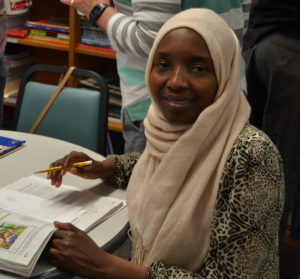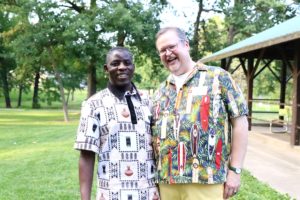
In a community like CMC, where tutors, students, and staff alike come from many different backgrounds and 51 countries, we’re bound to say each other’s names wrong. Yet the impact of a mispronounced name may be more harmful than we believed.
An excellent podcast from the Cult of Pedagogy discusses the unique duty educators have to pronounce students’ names well, especially when they aren’t anglicized. This article is based on the original podcast, which you can listen to here, or find on iTunes.
Jennifer Gonzalez, a National Board Certified teacher, explains in the podcast, “One of the simplest ways we can show respect to our students and show that we are interested in them as individuals… is to make an effort to pronounce their names correctly, or call them what they want to be called.” What happens if we don’t? “Whether you intend to or not,” Gonzalez says, “what you’re communicating is, ‘Your name is different, foreign, and weird. It’s not worth my time to get it right.’”
Oftentimes, students who come from other countries are used to the relentless mispronunciation of their name—at the doctor’s office, at the bank, at the coffee shop—which can serve as a constant reminder that they are considered an outsider. When we, as their friends and teachers, make an effort to say their name correctly, they understand that we care about them and value them. They belong.
A name well-spoken is a simple but meaningful gift we can all extend each other as we nurture an inclusive community at CMC.

How does this look in practice? Gonzalez remembers that the teachers she most appreciated as a student were those who did whatever it took to learn students’ names, even if it meant asking them on multiple occasions, or taking class time to practice. Although this might seem annoying or cumbersome, for her it was evidence that the teacher really cared.
As a tutor at CMC, it’s never too late to improve your pronunciation of your student’s name, even if you’ve worked with them for a long time. They will appreciate it!
- Don’t be afraid to admit your error.
- Ask them to teach you. Let yourself be the student, and they the teacher.
- Go online to hear native speakers pronounce the student’s name. Gonzalez recommends Hearnames.com.
- Make yourself a cheat sheet. Write out a phonetic pronunciation of their name, or draw a diagram linking each syllable to a familiar object. For example, Theotric is pronounced “thee” like movie theater, “AW” like opera, “trick” like trick or treat: “thee-AW-trick.”
- Don’t give up! Be careful never to impose a nickname on the student because it’s easier for you to pronounce, unless they tell you that’s what they prefer to be called. Believe in your ability to learn their name, and remind yourself that doing so will bear good fruit.
At CMC, we want to extend everyone the dignity of a well-pronounced name. So, we encourage you to correct staff members’ mispronunciations of your name or your student’s name. In doing so, you help us all include and respect one another.
Whatever it takes to learn your student’s name, Gonzalez reminds us, “It is worth the effort to get it right.” Every name is an opportunity to cultivate a welcoming community that embraces everyone just as they are.
By Mari Hunt Wassink, Education Program Coordinator at the Catherine McAuley Center.

